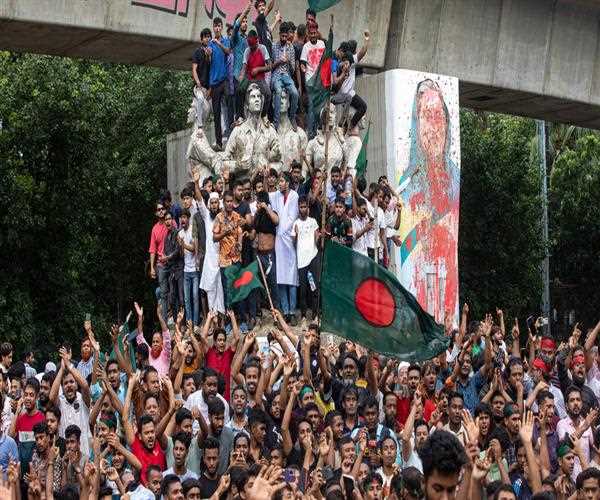
02-Sep-2024 , Updated on 9/2/2024 11:58:13 PM
What Happened in the Bangladesh Crisis and CIA Involvement?
Introduction
Recently, there has been a lot of discussion and speculation about the CIA's potential involvement in Bangladesh. A series of investigations and allegations suggest that the CIA may have conducted covert operations, obtained intelligence and waged diplomatic warfare in Bangladesh in recent years.
These concerns have sparked discussions about sovereignty, foreign involvement, and the larger implications for Bangladesh's democratic stability. An outline of the most recent events and the background behind these worries may be found below.
Background of Bangladesh's Political Landscape
Since gaining independence in 1971, Bangladesh has gone through a challenging political transition that has included times of military control, democratic modifications, and turmoil in politics. The Awami League, led by Sheikh Hasina, and the Bangladesh Nationalist Party (BNP), led by Khaleda Zia, largely dominated the country's politics, and tensions between the two parties led to frequent political unrest and isolated incidents of violence.
Human rights organisations and opposition parties have been accusing Sheikh Hasina's administration of authoritarianism, suppression of dissent, and limitations on press freedom in recent years. As a result of these developments, concerns about democracy in Bangladesh have become increasingly widespread at the national and international levels.
Allegations of CIA Involvement
Allegations are being made that the CIA carried out undercover operations in Bangladesh during the country's turmoil over politics. There are allegations that the CIA conducted covert operations there during Bangladesh's political turmoil. The allegations suggest that the CIA could operate covertly to influence political decisions, obtain intelligence on powerful political figures and possibly even overthrow governments. It is unclear exactly what these operations involved, and much of the material now available is sketchy and speculative.
Some of the key allegations include:
Surveillance and Intelligence Gathering: In recent reports, the CIA has been strongly gathering intelligence on Bangladeshi political leaders, military personnel, and civil society activists. This intelligence monitoring is said to be a component of an overall effort to keep an eye on the nation's political climate while assessing possible dangers to American interests in the area.
Influence Operations: There are allegations that the CIA was involved in operations aimed at changing the political structure of Bangladesh. It can be an attempt to persuade someone who has a different opinion, to support a particular political party, or to raise questions about authority in government. However, these claims are not supported by concrete evidence.
Support for Opposition Groups: According to some statements, it is said that the Central Intelligence Bureau, directly or indirectly, supports opposition parties in Bangladesh. This support may include cash, education or other materials to strengthen the Avame Alliance of the opposition party.
Government Response and Public Perception
Any claims that the CIA intervened in Bangladesh's domestic affairs have been vigorously denied by the government of Bangladesh. The accusations have been dismissed by officials as baseless and politically driven attempts to topple the government. In addition, the administration restated its pledge to safeguard Bangladesh's independence and sovereignty from outside meddling.
About these claims, the statements between the public are mixed. Some population groups (especially those who criticise the current government) tend to believe that foreign participation demands may have certain benefits. However, the government's supporters consider these allegations as part of the opposition and the development and stable large-scale movements of the Bangladesh Development and Foreign Political Parties.
Effect on Bangladesh-U.S. Ratio
Allegations of CIA participation in Bangladesh can be used to compress the connection between Dhaka and Washington. Although Bangladesh has historically had the most support from the US, particularly in the fields of commerce, security, and development, the CIA may face diplomatic problems as a result of the potential covert activities. If the claims are confirmed, the Bangladeshi government could decide to speak with the US administration more cautiously in the future. To do this, it could be required to reconsider security cooperation, intelligence sharing, and other bilateral relationship components.
Geopolitical Context
Bangladesh's fortunate location in South Asia has made it a target for attention from numerous international powers, including the United States, China, and India. The country's growing economy, proximity to the Bay of Bengal, and involvement in regional security dynamics have all contributed to its increased geopolitical significance.
Any claimed meddling in this regard by the CIA or other foreign intelligence services may be interpreted in this light as a component of a larger geopolitical fight for influence in the area. For instance, China and Bangladesh have been expanding their military and economic connections, so any unfriendly U.S. steps may draw Dhaka closer to Beijing.
The complicated and sometimes ambiguous domain of international relations and intelligence operations is shown by the current concerns over CIA involvement in Bangladesh. Even if a lot of the information has not yet been confirmed, the allegations have still spurred significant discussions over foreign meddling, sovereignty, and the future possibilities for democracy in Bangladesh.
The international community and the government of Bangladesh must carefully navigate these challenges as the situation develops to preserve the nation's political stability and independence while addressing any acceptable worries about foreign influence.

Student
Economics can be broken down into microeconomics, which looks at individual decisions, and macroeconomics, which is concerned with the economy as a whole. Both types of economics utilize historical trends and current conditions to inform business decision-making and make predictions about how markets might behave in the future. Students who choose to study economics not only gain the skills needed to understand complex markets but come away with strong analytical and problem-solving skills.
Join Our Newsletter
Subscribe to our newsletter to receive emails about new views posts, releases and updates.
Copyright 2010 - 2026 MindStick Software Pvt. Ltd. All Rights Reserved Privacy Policy | Terms & Conditions | Cookie Policy